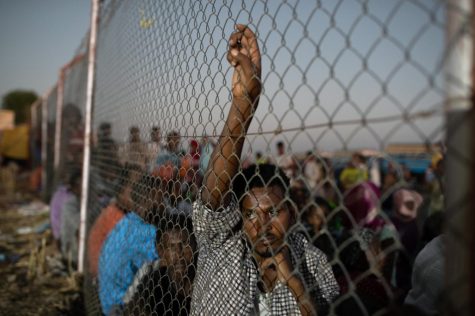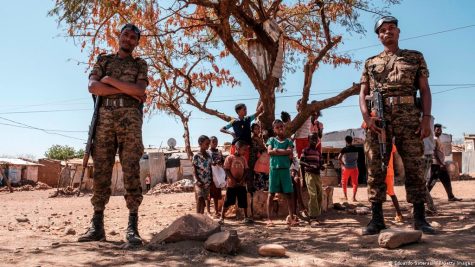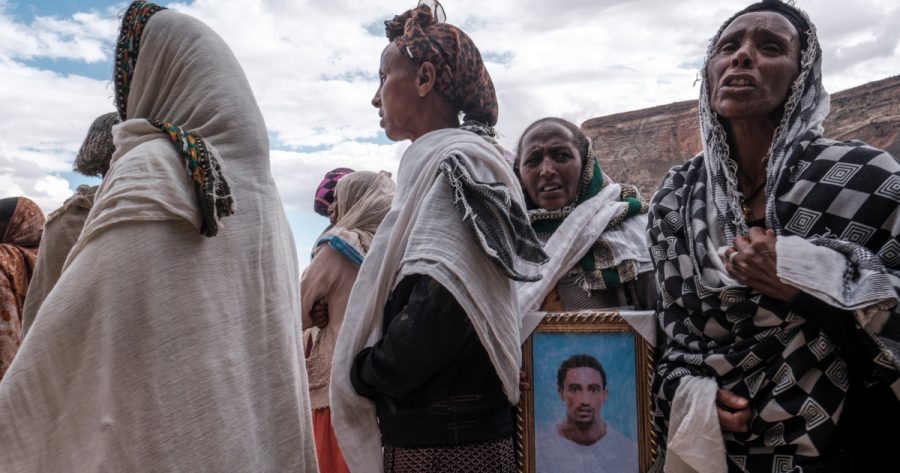Ethiopian Ethnic Cleansing
A look inside the conflict in the Tigray region of Ethiopia
(Photo by EDUARDO SOTERAS / AFP)
The Tigray Region of Ethiopia is the northernmost region in Ethiopia and also home of the ancient city of Aksum. 96% of the region identifies as Tigrayan which is a predominantly Orthodox Christian community. The region sits in a precarious position being bordered by Eritrea to the north and Sudan to the west. The region has had a contentious relationship in recent years with the federal government of Ethiopia.
Conflict began between the Special Forces of the Tigray Regional Government and the Ethiopian National Defense Force (ENDF) around midnight on November 3, 2020. The ENDF is being aided by Ethiopian Federal Police, regional police, and gendarmarie forces from neighboring regions. Tensions between the Tigray Regional Government and the national Ethiopian government began when Ethiopian Prime Minister Abiy Ahmed merged the Ethiopian People’s Revolutionary Democratic Front (EPRDF) with several other opposition parties to form The Prosperity Party. The Tigray People’s Liberation Front (TPLF), a prominent political opposition party in Ethiopian politics that had dominated for over 20 years, refused to join the new coalition party. The TPLF then declared Prime Minister Abiy Ahmed illegitimate as he had postponed elections set for August 29, 2020 to 2021 due to the Covid-19 pandemic. The TPLF ignored the federal governments decision and proceeded with its regional elections in September 2020, which the national government refused to recognize and deemed illegal.

Fighting began November 4th, 2020 when Tigray Special Forces army bases attacked army bases in the northwestern part of Ethiopia, and the ENDF responded with counter attacks in the Tigray region. The ENDF captured Mekelle, the capital city of the Tigray region, on November 28, 2020. Prime Minister Ahmed declared the war over but Tigray forces vowed to fight until the “invaders” were out. The Tigray special forces recaptured the capital city on June 28, 2021.
The conflict has become the subject of national attention in recent months due to the allegations of brutal ethnic cleansing by the ENDF and the Ethiopian federal government. Despite the Prime Minister’s claim of victory in November 2020, violence and bloodshed has continued in the Tigray region. Reports of rape being used as a military tool initially caught the eye of the international community in November and December 2020, but recent word from the ground says the violence has escalated exponentially to include ethnic cleansing of the Tigray people. The cause of this new surge of violence in the region is said to be the recapturing of Mekelle in June. The Tigray fighters have vowed to recapture the region in recent months and, as their message spread, the ENDF responded with brutality.
The center of the ethnic cleansing has been the City of Humera which falls within the Tigray region. Warning signs of the violence appeared in Sudan in July when the Tekeze (Ethiopian name) River was at its peak volume. Bodies began to appear on the banks of the river near Sudanese towns. In August, 2021 43 more bodies were found near the Sudanese towns. Members of the towns on the river in Sudan began to catalog the bodies, making sure to note the consistent signs of an execution style death. The bodies were confirmed to have not drowned, and all were exposed to some chemical agent after they had died that had somewhat preserved their bodies. The preservation of the bodies has allowed medical experts in Sudan to catalog the similar wounds on multiple victims. Officials are hoping to collect as much evidence from the bodies as they can to prove war crimes are being committed. Many members of these Sudanese towns have families in the Tigray region or are from the Tigray region themselves having fled the violence; those members of the community fear that the people being collected from the river could be family members. Throughout this conflict, 2 million people have been displaced from their homes with some deciding to head west to Sudan.

Reports of mass holding facilities being set up in the Humera region to contain civilians who are ethnic Tigrayan have been coming from Sudan and Ethiopia. Warehouses, police stations, prisons, and newly created sites are all being used to hold thousands of people at a time. According to CNN, conditions within the facilities are abysmal: food is not provided, toilets are not provided, and people have to relieve themselves on the floor. CNN identified 9 sites in the Humera region that are being used as detention centers. People who have escaped the sites have told authorities in Sudan and major news companies that the guards routinely take people out at night and those people are never returned. Others have reported seeing the guards dump bodies into the rivers at night in an attempt to hide their actions. Amhara forces from the neighboring region have been going door to door to round up anyone who identifies as ethnic Tigrayan.
Little global attention has been afforded to the people of the Tigray region and those close to the conflict fear that it may never come. President Biden met with Kenyan President Uhuru Kenyatta, and among other things, they discussed the situation in Ethiopia. The White House was careful with their words in the press release, falling short of calling it genocide but rather: “the deteriorating humanitarian and human rights crises in Ethiopia’s Tigray region and the need to prevent further loss of life and ensure humanitarian access.” Ethiopia is a vital ally to the United States in Africa and a loss of diplomatic relations between the two countries would be devastating to U.S. African foreign policy.
The people of the Tigray region and those across the border in Sudan have tried to raise the issue to a global spotlight, but have struggled to gain traction. In recent weeks reports of concentration camps and the digging of mass graves has caught the attention of western news. Articles have been published in several major news sites, but without the reaction of governments around the world there is little hope for the Tigrayan people.







